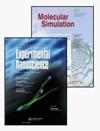Molecular dynamics simulation of tensile strain-altered hydrogen behaviour and its effects on local plasticity
IF 2
4区 化学
Q4 CHEMISTRY, PHYSICAL
引用次数: 2
Abstract
Abstract Using molecular dynamics simulation, local plasticity of bcc Fe (0 0 1) is studied at different density of Fe–H cluster. H-induced softening and hardening of Fe substrate are observed along with the tensile elongation at low and high density, respectively. The two contradictory phenomena are ascribed to H behaviours-related plastic deformation. At high H partial pressure, initial H aggregation would lead to the formation of many H-enriched clusters similar to hydride. Tensile strain-induced dislocations (TSID) prefer to be generated and grow at the weakening interface of clusters and iron substrate. At low H partial pressure, TSIDs are uniformly distributed in the whole substrate. Owing to the affinity between H and dislocations, the diffusion of H appears to be distinct under different spatial distribution of TSIDs. H aggregation and dispersion can be enhanced and produce nonuniform and uniform plastic deformation during the continuous tensile process at high and low Fe–H cluster density, respectively. The former can stimulate local failures and accelerate the degradation of mechanical property. The results are helpful for better understanding of Fe–H cluster-related hardening and softening considering external strain-altered H behaviours except for the mechanism of H-dislocation interaction.拉伸应变改变氢行为的分子动力学模拟及其对局部塑性的影响
摘要采用分子动力学模拟方法,研究了不同Fe - h团簇密度下bcc Fe(0 0 1)的局部塑性。在低密度和高密度条件下,随着拉伸伸长率的增加,铁基体出现了h诱导的软化和硬化现象。这两种矛盾的现象归因于H行为相关的塑性变形。在高H分压下,初始H聚集会形成许多类似氢化物的富H团簇。拉伸应变诱发位错(TSID)倾向于在团簇与铁基体的弱化界面产生和生长。在低H分压下,sids均匀分布在整个衬底中。由于H与位错的亲和关系,在不同的TSIDs空间分布下,H的扩散表现出明显的差异。在高铁-氢团簇密度和低铁-氢团簇密度的连续拉伸过程中,H的聚集和弥散增强,分别产生不均匀和均匀塑性变形。前者可以刺激局部破坏,加速力学性能的退化。研究结果有助于更好地理解除H位错相互作用机制外,外加应变改变H行为的Fe-H团簇相关硬化和软化过程。
本文章由计算机程序翻译,如有差异,请以英文原文为准。
求助全文
约1分钟内获得全文
求助全文
来源期刊

Molecular Simulation
化学-物理:原子、分子和化学物理
CiteScore
3.80
自引率
9.50%
发文量
128
审稿时长
3.1 months
期刊介绍:
Molecular Simulation covers all aspects of research related to, or of importance to, molecular modelling and simulation.
Molecular Simulation brings together the most significant papers concerned with applications of simulation methods, and original contributions to the development of simulation methodology from biology, biochemistry, chemistry, engineering, materials science, medicine and physics.
The aim is to provide a forum in which cross fertilization between application areas, methodologies, disciplines, as well as academic and industrial researchers can take place and new developments can be encouraged.
Molecular Simulation is of interest to all researchers using or developing simulation methods based on statistical mechanics/quantum mechanics. This includes molecular dynamics (MD, AIMD), Monte Carlo, ab initio methods related to simulation, multiscale and coarse graining methods.
 求助内容:
求助内容: 应助结果提醒方式:
应助结果提醒方式:


